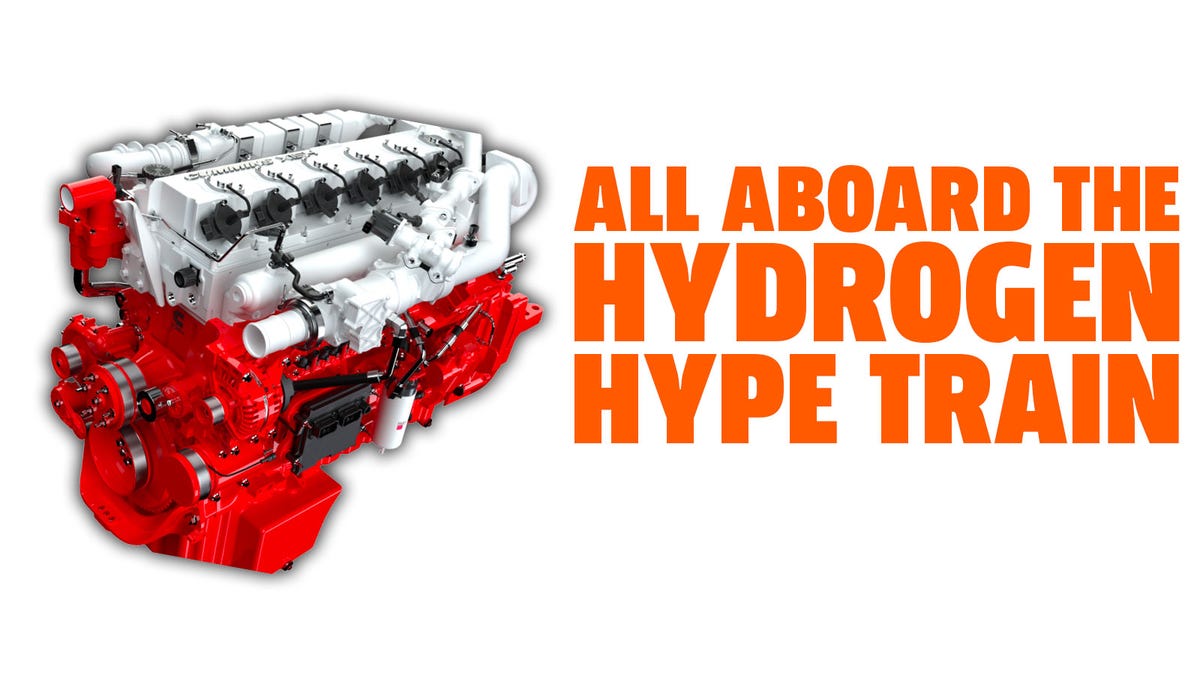Cummins Pivots From Diesel to a 15-Liter Hydrogen Engine of the Future

Toot toot. Image: Cummins
In a world focused on cleaner fuels, more efficient engines and minimal tailpipe emissions, the humble diesel engine finds itself staring down the barrel of a loaded gun. But Cummins, maker of the diesel-powered motors found in everything from trucks to tractors, thinks hydrogen may hold the key to its high-torque future.
For more than 100 years, Cummins has been churning out diesel engines to power school buses, motorhomes and agricultural equipment. Heck, it even powered some pretty sweet arctic exploration vehicles in the past as well.
But times are changing, and you can’t just strap a diesel engine into a truck and hope its slightly higher MPG will please your friendly neighborhood ecologist. So, Cummins had to put its thinking cap on and ponder the future of its monster motors – because in some situations an electric motor still won’t quite cut it.
And at an event in California this week, Cummins unveiled its possible vision for the future: a 15-liter, hydrogen-powered engine.
This monster motor has been built on the company’s new “fuel-agnostic platform,” which features a range of engines that can run on a variety of fuel types.
In each motor, the head gasket unit contains “largely similar components” regardless of fuel type. The rest of the power unit will use “different components for different fuel types.”
This hydrogen-fueled example showcased by Cummins will hopefully make it into production in 2027. The firm says it will build a 15-liter example, as well as a more modest 6.7-liter displacement engine. These options, it says, will “enable the industry to take action and reduce GHG emissions.”
In testing, Cummins has so far managed to muster 810 ft-lbs torque and 290 hp from a medium-duty test engine.
Hydrogen power is Cummins soon. Image: Cummins
But Cummins isn’t the first automaker to eye a hydrogen-powered future. In recent months, both Ford and Yamaha have teased details about a possible switch to hydrogen in their internal combustion engined vehicles.
These firms have set their sights on hydrogen power for a number of reasons. Firstly, Cummins says the new engines can be fueled “at a lower initial price of a fuel cell or battery electric vehicle.” The company also said that converting current vehicles to utilize hydrogen requires “little modification.”
In a press release, Daryl Wilson, executive director of the Hydrogen Council, said:
“Heavy-duty trucking is critical to the global economy and is one of the hard-to-abate sectors of the economy.
“We are encouraged by progress at Cummins in the development of hydrogen-fueled internal combustion engines and look forward to continued advancements that can help us reach cost-effective decarbonization of economies worldwide.”
And it wasn’t just a new motor that Cummins was shouting about this week. The firm has also partnered with Daimler Truck in North America to roll its hydrogen power units out onto the road.
As part of the tie-up, Cummins will upfit Freightliner Cascadia trucks with a Cummins hydrogen fuel cell powertrain for use in North America. The trucks will use Cummins’ fourth-generation fuel cell powertrain, which the firm says is more efficient and durable.
The two companies say they will have hydrogen-powered units available for select customers from 2024.


